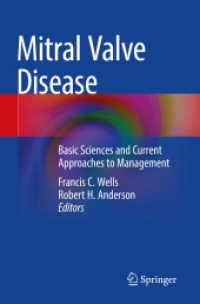- ホーム
- > 洋書
- > 英文書
- > Performing Arts
Full Description
Melds philosophical analysis with early cinematic history to develop a fresh theory of the notion of comedy.
The Comedy of Philosophy brings modern debates in continental philosophy to bear on the historical study of early cinematic comedy. Through the films of Mack Sennett, Buster Keaton, Charlie Chaplin, Harold Lloyd, and the Marx Brothers, Lisa Trahair investigates early cinema's exploration of sense and nonsense by utilizing the contributions to the philosophy of comedy made by Freud and Bataille and by examining significant poststructuralist interpretations of their work. Trahair explores the shift from the excessive physical slapstick of the Mack Sennett era to the so-called structural comedy of the 1920s, and also offers a new perspective on the importance of psychoanalysis for the study of film by focusing on the implications of Freud's theory of the unconscious for our understanding of visuality.
Contents
List of Illustrations
Acknowledgments
Introduction
1. The Comedy of Philosophy: Hegel, Bataille, and Derrida
2. Restricted and General Economy: Narrative, Gag and Slapstick in One Week
3. The Machine of Comedy: Gunning, Deleuze, and Buster Keaton
4. Fool's Gold: Metamorphoses in Sherlock Jr.
5. Jokes and Their Relation to...
6. The Comic: Degradation and Refinement in 1920s Cinematic Slapstick
7. From Words to Images (Gagging)
8. Figural Vision: Freud, Lyotard, and City Lights
9. Preposterous Figurality: Comic Cinema and Bad Metaphor
Notes
Bibliography
Index








